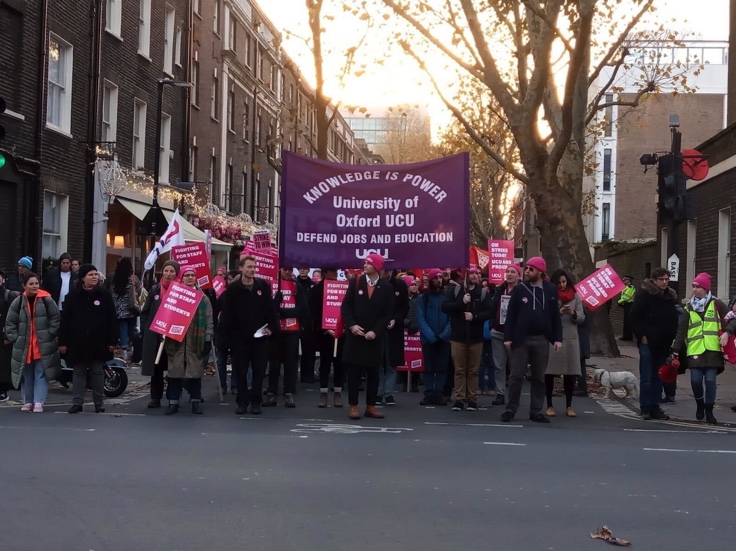
The Isis interviews Dylan Carver, UCU Anti-Casualisation Officer
by Zoe Davis | February 26, 2023
Last Thursday, 17 February, the UCU (University College Union) announced that the strike action for the remainder of February would be called off. No longer would I walk past the Maths Institute and see a crowd of lecturers at the picket line. What had otherwise been a Hilary Term coloured by cancelled tutorials and a pile of UCU pamphlets collecting in my room would end in a guise of normalcy. To understand these changes, and learn more about what the past term of strikes has accomplished, I spoke to Dylan Carver, one of the University of Oxford’s two anti-casualisation officers.
The casualisation of lecturers is at the heart of the strikes. Dylan’s role, along with his co-officer George Mather, is to “try and secure better pay and working conditions for people who are on short-term contracts.” Along with questions of pay equity and lecturer workload, these issues which the UCU are currently negotiating with the universities, hence the current pause in industrial action.
But when I ask Dylan how he feels about the strikes being over, he cautions me: “it is premature to say the strikes have ended.” The current reprieve is to allow for negotiations, “and there’s every possibility that if these negotiations aren’t productive, we’ll be forced to prolong our strike action.” Dylan cannot say for certain if that’s likely or not: “The negotiations take place in a closed room. Up until this point, it’s clear that universities have dragged their feet and refused to acknowledge the gravity of the situation.” While there has been momentum towards eliminating insecure contracts, “no firm commitments are on the table in terms of pay.”
It should come as no surprise that pay is so contentious. Anyone who has looked at their batells recently is familiar with the current state of inflation, and Dylan notes that the Covid-19 and Ukrainian invasion crises have impacted wages. But lecturers are not only striking because of recent economic changes. When I ask Dylan to summarise the reasons for striking, he pauses: any explanation would require a ten-decade history on the working conditions of universities, the creation of “the academic gig economy and the uberization of higher education.”
The current state of academia, as narrated by Dylan, is bleak. If you’ve picked up a strike flyer recently, you might be familiar with the numbers: pay is declining by 25%, the disability pay gap is 9%, the racial pay gap 17%, and tenure has been relegated to a thing of fantasy, as universities move towards insecure, contractual modes of employment. Even these numbers don’t fully capture how much the lived experience of being a lecturer has transformed over the last decade. “Previously, you did a year or two of insecure work, and it was seen as a pathway to getting a tenure track job. Then you would have a job for life. Those pathways don’t exist anywhere, and career progression options aren’t there.”
Instead, lecturers find themselves “in this constant churn of having to apply for new jobs – even reapply for their own job – and it’s incredibly stressful. Over 50% of academics show signs related to clinical depression. This impacts their ability to do world-leading research, groundbreaking teaching, and support our students. These strikes are about improving working conditions, but they’re also about improving learning conditions.” When strikes are depicted as interfering with student learning, it overlooks just how much learning has thus far hinged on the sacrifices of lecturers. “Most academics are doing the equivalent of two days’ unpaid extra work per week. This is about having a weekend or not. Academics currently aren’t entitled to that. We’re talking about the real fundamentals here.”
This is not the story told by university employers, of course. Wage increases are painted as inappropriate in the current economy. When I asked if the universities were disingenuous in these claims, Dylan nearly laughs at the obviousness. “In the backdrop of this wage crisis, universities are making massive profits – just record incomes. Last year, the University of Oxford made a net profit of £3.4 billion. The entire package of UCU demands is estimated to cost £1.5 billion. And that’s apparently unaffordable. At the same time, the vice-chancellors are on average paid £315,000, and on the higher end they’re paid over double that – £714,000.”
Dylan finds this current state of academia especially disheartening when in the classroom. “I’m a teacher. I love my teaching role, but to be in the classroom and talk to students who also want to go into academia because they love their subject is difficult. Because the reality is that the majority of people will never find stable, well-paying jobs. The situation is becoming increasingly worse.”
Fortunately, there are steps which students can take to support their striking lecturers (as well as their own future career prospects). Dylan happily notes that “we’ve been overwhelmed by the level of student support so far.” If strikes restart again, he asked that “students not cross any picket lines. That really shows your teachers that you stand with them. Students can pass JCR and MCR motions too. That’s a brilliant way to support the strike.”
I end by asking Dylan if there is anything he thinks that students should understand about how the universities are interacting with the strikes. He pauses, thinks for a moment, and then answers: “this is all developing because of the way universities are managed like a business. They want their capital to grow, and they don’t want to dip into their reserves. Nominally, it’s because they’re saving for a rainy day. But the situation is in crisis. This is that rainy day.”
Nodding, I make a mental note that the Hertford JCR has a new motion proposal somewhere in its future. ∎
Words by Zoe Davis.




